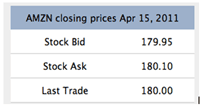By better understanding how options are assigned, traders can make more effective decisions as expiration day draws closer. Also, see how getting assigned can sometimes be beneficial.
One of the most common questions option traders ask is whether or not their options will be assigned at expiration, resulting in ownership of the underlying stock. They want to know if they will be automatically assigned on expiration day if the stock closes at the strike price.
First, it is important to clarify what "closed at the strike price" means. Stocks don't have just one price. They often have three: the bid, the ask, and the last trade (which is often between the bid and ask).
Which one should you use to know if your covered call is in the money or not?
For example, consider Amazon.com (AMZN) on April 15 (option expiration day). Imagine you had shorted the April 180 calls and had these closing prices:
Will your options at the $180 strike price be assigned to you or not?
Well, it's not so much the price you want to use as it is the price that the option buyer decides to use.
It is the option buyer's decision on whether or not to exercise his option. The fundamental question he is asking himself is "Should I buy the stock today (expiration Friday) and pay the strike price per share, or do I think can buy it for less when the market opens on Monday, when I will pay the asking price at that time?"
Essentially, what will the weekend bring? AMZN could gap up on Monday, or gap down, or it could open right near the closing price on Friday.
Once the option holders have made up their minds, they send their decisions to their brokers, who in turn tell the Chicago Board Options Exchange (CBOE) that they have clients who are exercising their options. The CBOE will then randomly assign exercise notices among all the people who are short the option being exercised.
When a stock closes within pennies of a strike price on option expiration day, some percentage of the outstanding options will be exercised and some will not.
Some option holders will decide to wait until Monday to buy the stock in the open market, while others will want to own it over the weekend. Because the assignment by the CBOE is random, if you have multiple contracts you've shorted (which close at the money), you may be assigned on some, but not on others. If you shorted ten contracts, you might be assigned on zero, three, six, or all ten (or any other number…it's random).
NOTE: We've been talking about at-the-money options on option expiration day. If you have options that are definitely in the money (by more than a few pennies) on expiration day, then they will all be assigned due to automatic exercise of in-the-money options by brokers.
If you really do not want them to be assigned (for tax reasons or some other reason based on your trading plan), then your best choice as the option seller is to buy back the options near the close on expiration Friday.
By closing them out, you don't have to worry about random assignment or any after-hours price action in the underlying stock that may occur.
And, in case you are wondering what happened in the AMZN example: On Monday after expiration, the stock opened down about two points. The option holders who exercised on Friday were wishing they hadn't, and the option sellers who were assigned are now glad they were (if they still liked the stock, they could take the money they received from assignment and buy more shares for less).
It is important for any trader to plan out each scenario so that they aren’t surprised if they are assigned at any time.
By Mark Scanlin of BornToSell.com
See Related Video: Understanding Options Assignment










